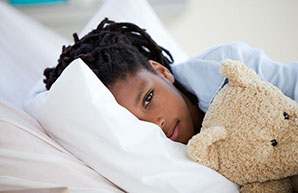While many children rise above the tests of childhood cancer and go on to excel in their adult lives, there is also a gauntlet of emotional and developmental turmoil the disease can leave in its wake.
Samantha Nicholson was 14 when she was diagnosed with a giant bone cell tumour in her left heel. She remembers feeling petrified when she got the news, like her world was falling apart. However, after nine gruelling months of recovery after surgical treatment, she went into remission. The disease then returned when she was 17, but it was once again conquered.
Today Sam is 28 and a practicing molecular biologist, specialising in the development of new therapies to combat cancer. Her early run-in with the disease has played a large part in making her the woman she is today, she says. This is the case with many survivors of childhood cancer.
Love and support
In Sam’s case, thanks to the correct resources and support, the trials of the disease have made her a stronger person. When she was sick she remembers someone telling her that pressure makes a diamond, and that she was meant to be a dazzling, brilliant gem.
She attributes her survival to the love and support of her family, right from the moment she got her diagnosis and her mom took her hand and told her not to worry, they were going to fight it together.
“Without the positive attitude of my family I might not have managed as well as I have,” she says. “I think that for any child knowing they are loved can help them climb any mountain.” She says the experience has made her think more about her general health, so she eats healthily and exercises regularly to avoid falling ill again.
Negative perceptions
Unfortunately though, not all survivors of childhood cancer fare as well as Sam has. One of the most common after-effects of a battle with childhood cancer is a child’s negative perception of their own self-worth and physical appearance, says clinical psychologist Mareli Fischer.
“This low self-esteem combined with missing school while ill, can have a negative impact on the child’s future academic performance and social life, and puts them at risk of developing symptoms of depression and anxiety,” says Fischer. “There is also the risk of learning difficulties, problems adjusting, and having a hard time forming peer relationships.”
In severe cases, Fischer warns that some survivors of childhood cancer struggle with post-traumatic stress disorder (PTSD), and others have an ongoing fear of death and physical ailments.
There is also the risk that the children will develop a sense of entitlement, which Fischer describes as “a belief that they deserve special treatment as compensation for everything they have been through, coupled with the conviction that their bad behaviour or carelessness should be excused. This kind of attitude can have damaging effects on relationships and achievement potential,” she explains.
Get your child the help they need
If you’re caring for a child with cancer, be sure to seek help not just for your child’s physical wellbeing, but for their emotional and developmental wellbeing too.
Ask your oncologist to recommend mental health care professionals in your area who can offer you and your child support and advice during this trying time, so that they can emerge from their illness ready to give themselves and the world a second chance.

